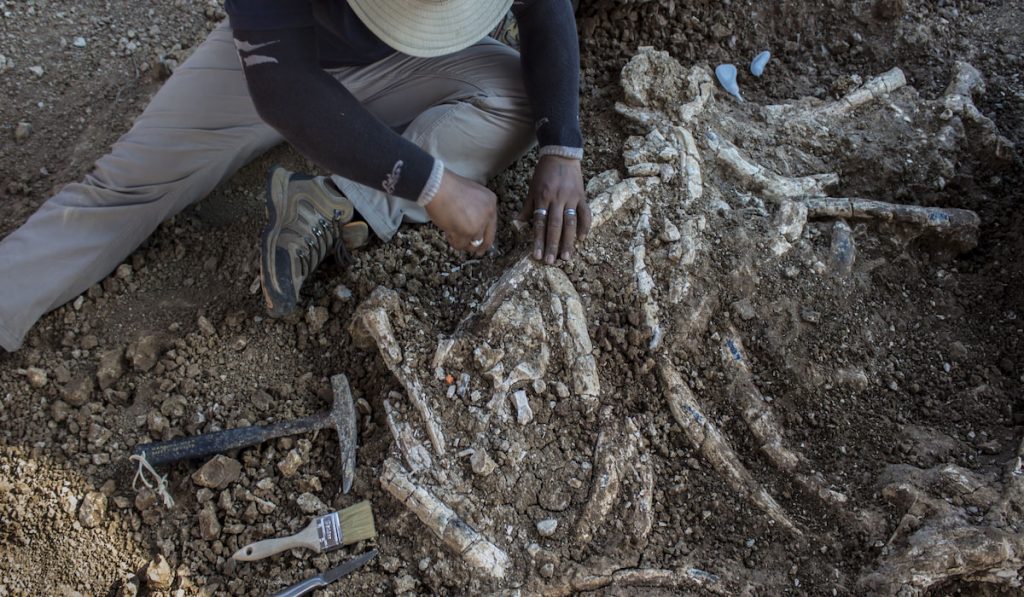Do Paleontologists Make Good Money?
Most people assume that paleontologists make a good money because the job sounds rather complex and probably requires a lot of education.
The truth is, the amount of money a paleontologist makes really depends on how much work they put into it.
Paleontologists not only have to go through a lot of on-the-job training, they also need a substantial amount of education to even enter the field.
For anyone considering paleontology as a career path, it is important to know if paleontologists make good money and what exactly the road to becoming a paleontologist entails.
Learning the most important aspects of the field of paleontology is the first step to deciding if it is the right career choice for you.
What Do Paleontologists Do?
Paleontologists do exactly what you think they do—study fossils—but that is not the full extent of it. It is also important to know that they study far more than dinosaur fossils, although that may be what interested some of them initially.
Paleontologists are geoscientists that study the fossils of almost all organisms to learn more about our planet’s history and how life exists in the face of its environment.
There is not just one general paleontology arena to work in; there are different, more specific fields within the science that paleontologists can specialize in. Some specialize in plant fossils while others specialize in the fossils of animals that do not have backbones.
Paleontologists could focus on how and why entire ecosystems were able to grow, but others may work only with the fossils of backboned animals. The field of paleontology is so complex and extensive that specialized fields are a necessity.
Do They Make Good Money?
Paleontologists do make good money, however, it may be less than what many people would imagine. The exact salary amount for a paleontologist can vary significantly depending on their region and the nature of their job.
Paleontologists that teach in colleges and architecture do not make as much as those that work in the government or in the oil and gas industry.
Regardless of what industry they work in, most paleontologists make a decent annual salary and what many people would consider good money.

Salary Range
The salary range of geoscientists, including paleontologists, varied between about $52,000 to $201,150 in 2020, while the average annual salary was $93,580.
A paleontologist’s specific salary varies greatly depending on the amount of education they have, what field they specialize in, who they work for, and how much experience they possess.
Those with doctorate degrees who have at least a decade or more of experience earn far more than paleontologists just entering the field.
In 2020, geoscientists in the state government or educational system made an average salary of $74,200 to $77,930 annually. Those working in the federal government and gas industry could bring in an average annual salary of $104,210 to $125,670.

Is Being a Paleontologist a Good Job?
Just because a job brings in good money, it does not necessarily mean that it is a good job overall. For the most part, however, being a paleontologist is a good job, but it definitely has its downfalls.
The great thing about being a paleontologist is the opportunity to travel, not just around the country, but across the world sometimes.
The downside to that is the fact that many paleontologists, depending on their field, are gone for months at a time on assignments.
Another perk of being a paleontologist is that they get to work with lots of other scientists and experts to do research and complete jobs. A big downfall is that most paleontologists work extra long hours or odd shifts.
Paleontologists also get the chance to work and experience the outdoors instead of spending all their time in an office or industrial setting. The downfall is that they are constantly exposed to nature’s elements, which may be extreme depending on the region.
What Education Do Paleontologists Need?
Geoscientists who specialize in paleontology have to at least have a Bachelor’s degree in geosciences to even be considered for an entry-level job in paleontology. To advance in the field or get better positions, a master’s degree or doctorate in paleontology is required.
Most colleges and universities that offer paleontology programs work with the students to help them obtain jobs as soon as they graduate. Again, the more education they have, the better career position a paleontologist will be able to obtain or aspire to.

Is Paleontology a Dying Field?
Although some may think paleontology is a dying field, it is not. Geoscientist employment, including paleontologists, is expected to grow significantly over the next decade.
The ever-changing environment and the never-ending need to conserve resources have ensured the future of the paleontology field.
Paleontology is not just about studying dinosaur fossils; it is an essential job that has cemented its place in the job world, at least for the foreseen future.
Final Thoughts
Paleontology is a great job field to enter because paleontologists make good money and they have significant job security, at least for the next ten years. The more education that a geoscientist has in the paleontology field, the more money they can expect to earn.
If science, the Earth, and the idea of traveling and spending significant amounts of time in the field interest you, then paleontology may be a job you need to consider.
Resources:
Researching all the occupational aspects of being a paleontologist is very enlightening. Here are the sources used to craft this article.
- https://www.americangeosciences.org/education/k5geosource/careers/paleontologist
- https://www.bls.gov/ooh/life-physical-and-social-science/geoscientists.htm#tab-5
- https://www.bls.gov/ooh/life-physical-and-social-science/geoscientists.htm#tab-2
- https://www.indeed.com/career-advice/pay-salary/how-much-does-a-paleontologist-make
- https://en.wikipedia.org/wiki/Paleontology







